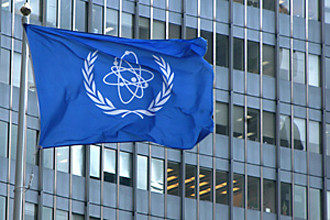A team of experts concluded an 11-day International Atomic Energy Agency (IAEA) mission to review the emergency preparedness and response arrangements in the United Arab Emirates (UAE) for the Barakah Nuclear Power Plant. The mission was carried out at the invitation of the UAE government.
Raoul Awad, Director General, Security and Safeguards from the Canadian Nuclear Safety Commission, led the review team, which included experts from Brazil, Canada, France, Morocco, the United States and the IAEA. "The UAE has built its nuclear emergency preparedness and response programme in an effective way on the basis of an already strong national infrastructure for crisis and emergency management," Mr Awad said at the mission's closing meeting on 31 March. "The partnership between the National Emergency Crisis and Disasters Management Authority, the Ministry of Interior, the Federal Authority for Nuclear Regulation and the Emirates Nuclear Energy Corporation is key to the success achieved thus far."
The Emergency Preparedness Review Service (EPREV) team identified strengths in several areas, including:
- A clear definition of roles and responsibilities of the organisations that would manage nuclear emergencies.
- Significant progress in the development of facilities and capabilities to manage the medical response.
The UAE also demonstrated excellence in two areas, to be shared with the international emergency preparedness and response community. These included:
- The co-location in Al Ruwais of the emergency operations centres for the management of onsite and offsite response. This is a unique feature of the UAE nuclear emergency management framework and can greatly enhance the effectiveness of the cooperation between the operator and the offsite emergency management authorities, a key to the success of any emergency response.
- As a member of the Gulf Cooperation Council's Regional Nuclear and Radiological Emergency Preparedness and Response Plan, the UAE can achieve a high degree of harmonisation and coordination with its neighbours during a nuclear emergency, another important element for the success of global emergency response.
The review team also highlighted areas where further progress is necessary, including:
- The arrangements to decide how best to protect the public during an emergency need to be further clarified.
- The public information arrangements for a nuclear emergency, vital to an effective response, need to be consistent in all plans.
- All emergency response organisations need to ensure that sufficient qualified personnel are available for a prolonged response to protect the public.
- The current efforts to complete and test plans, facilities, tools and systems need to be maintained.
The EPREV team noted the excellent cooperation of all organisations involved in the review mission. In particular, the team noted a commitment to excellence displayed by all parties met during the mission.
"By requesting this mission, the UAE demonstrated its dedication to continuous improvement in nuclear safety," said Denis Flory, Deputy Director General, Head of the Department of Nuclear Safety and Security at the IAEA. "International peer review missions are designed to identify strengths and opportunities for improvements in a spirit of transparency and quest for excellence. This mission is one of many conducted by the IAEA to assist the UAE achieve a safe, reliable and sustainable nuclear power programme."
About EPREV Missions
EPREV missions are one of the peer review missions offered by the IAEA to strengthen nuclear safety in Member States. EPREV missions focus on the arrangements and capabilities to prepare for and respond to nuclear and radiological emergencies. EPREV missions are not audits or inspections. They aim at providing an open and transparent review while fostering a professional exchange of ideas and best practices among review experts and their national colleagues. EPREV missions are based on the IAEA Safety Standards in nuclear and radiological emergency preparedness and response.


